Term Page
Enforcement 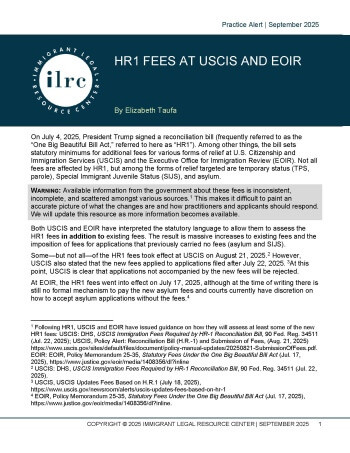
This practice advisory provides information about recently implemented fee increases at USCIS and EOIR. These fee increases are a result of the “One Big Beautiful Bill Act” also known as HR1. This advisory explores what we know and what we still don’t know about the fees, how to pay them, and potential future changes.
On July 28, 2025, the ILRC submitted a comment opposing a new government rule that imposes massive civil fines—sometimes up to nearly $2 million—on immigrants who entered the U.S. without authorization or did not leave after a removal order.
Recently, the Department of Justice (DOJ) published a memo listing out its priorities for civil enforcement cases. In that memo, the DOJ states that it will be focusing on denaturalization cases. This memo - along with statements made by administration officials and members of congress - has sparked a lot of attention on denaturalization and questions about who could be denaturalized. This has caused a lot of fear and uncertainty in communities, but denaturalization is not as straightforward as you might think.
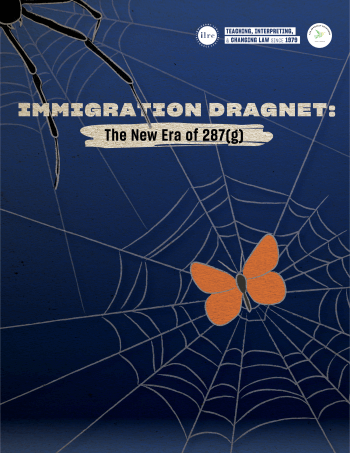
Section 287(g) of the Immigration and Nationality Act (“INA”) authorized the creation of a program that allows state and local law enforcement agencies to act as immigration enforcement agents.This policy brief reviews the recent history of 287(g) agreements and how they’ve proliferated, describes the three 287(g) agreement models, examines a case study of escalating 287(g) programs in Florida, delves into the programs’ dangers and harms, and provides some recommendations for local communities that want to stop 287(g) agreements in their tracks.
A resource highlighting interior enforcement practices within the Harris county region of Houston, Texas.
Community members across the country are reporting visits from immigration and other federal officers seeking to meet with certain children who entered the United States unaccompanied. These children are often referred to as “unaccompanied children” (UCs) because at the time they were arrested by immigration (such as crossing the border), they were not with a parent or legal guardian. Although these visits are sometimes described as “wellness checks,” they are part of a broader, coordinated effort to locate and deport some vulnerable young people and their sponsors. It is crucial for families and immigrant communities to stay informed, exercise their rights, and seek legal support when needed.
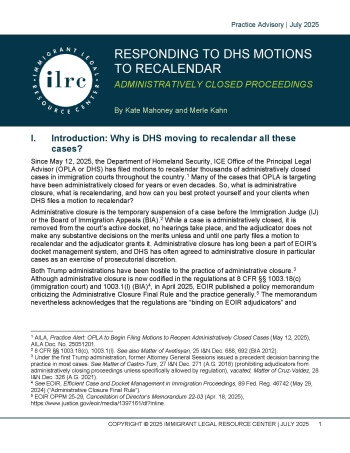
In recent months, the Department of Homeland Security has begun filing thousands of motions to recalendar administratively closed proceedings. This trend is raising questions about how attorneys and accredited representatives can respond to these motions and protect their clients’ interests, particularly in cases that have been administratively closed for many years. This advisory explores those questions and offers strategy considerations when determining how to proceed in each case.
The ILRC has prepared free, downloadable signs to help you let your local communities know that you stand with them! Tell ICE that you are prepared to defend your guests, patrons, students, patients, or clients from unlawful entry or intimidation.
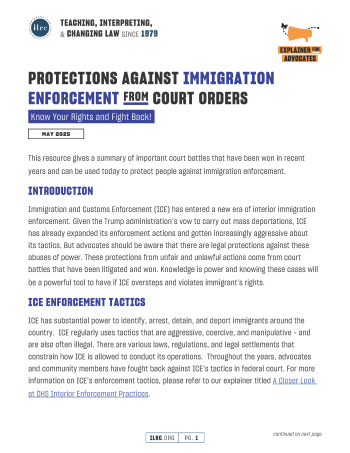
Given the Trump administration’s vow to carry out mass deportations, ICE has already expanded its enforcement actions and gotten increasingly aggressive about its tactics. But advocates should be aware that there are legal protections against these abuses of power. These protections from unfair and unlawful actions come from court battles that have been litigated and won. Knowledge is power and knowing these cases will be a powerful tool to have if ICE oversteps and violates immigrant’s rights.
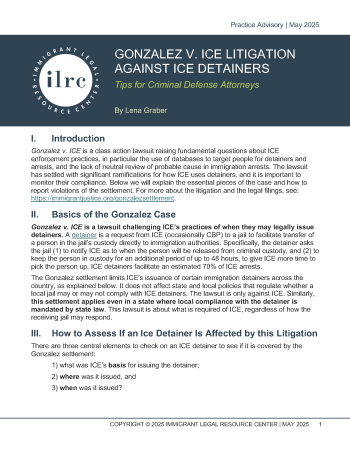
Step by step explanation for criminal defense counsel of how to identify ICE detainers that may be issued in violation of the Gonzalez v. ICE class action. This class action settlement applies nation-wide to limit ICE’s issuance of detainers. This advisory walks through the basics of the case and how to monitor and respond to any violations of the settlement.